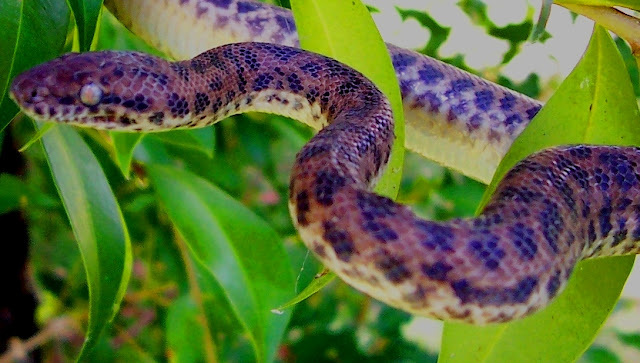When people think of pets, most of the time "furry" and "cuddly" are adjectives that come to mind. For the owners of pet snakes, however, these words don't really fit. Still, snakes make interesting pets, and can even be lovable - in their own way.
 |
| Photo Wikimedia |
Choosing to own a pet snake should not be a snap decision. Snakes can grow large, eat a lot, and require very specific conditions for staying healthy. Some varieties can even be dangerous to humans. Providing for their needs can be quite expensive. To top it all off, snakes tend to have a long lifespan. For the sake of the snake, don't buy one without being sure you are ready to make the commitment.
All snakes are meat-eaters. Many snake owners keep live mice or rats, which multiply rapidly, as food for their snakes. It is recommended that snakes be fed pre-killed prey animals instead of live ones. Especially if the snake is not real hungry, a live prey animal can inflict injuries to the snake. Many snake enthusiasts order frozen mice for their snakes. Others raise mice and kill them as needed to feed their snakes.
The good part of feeding a snake is that most shouldn't be fed more often than once a week and some can go for several weeks between feedings. The reason is that they don't have to expend any energy creating their own body heat. In fact, if the cage is not warm enough, a snake can't even digest its food.
The enclosure, or cage, for the snake needs to be first of all escape proof. Snakes are escape artists, and don't need a very big opening in order to find a way out. The cage also has to have a source of heat. Because they are cold blooded, snakes must have a variety of temperatures to choose from. This is how they regulate their body heat. For best results, the enclosure should be heated on one side only and thermometers used on both ends. Each snake species has specific needs in terms of heat, and you should find out these needs before getting a snake.
Other needs include a bowl of water, several places to hide, and a floor lining. If you’re on a tight budget, newspaper works well for most snake varieties. It can easily be replaced when soiled. The water should be kept clean, too. Any wastes or uneaten food should be removed quickly. The cage should be thoroughly cleaned and disinfected about once a month.
Keeping a pet snake is a responsibility that can also be an adventure. If you are a beginner, you should start with one of the easier snakes to keep. Do a little research, and you will find out that pet snake breeds are generally rated according to how hard they are to keep. In time, you will learn the ins and outs of snake keeping, and can expand your collection to include some of the more exotic types.

No comments:
Post a Comment